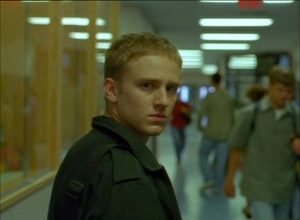 The writers/directors of Duck! The Carbine High Massacre warned us this would happen. Bang Bang You’re Dead is just the “‘made for TV’ movie” the opening title card for their little school-centric rampage picture warned us about. Based on the one act play of the same name by Eugene, Oregon resident William Mastrosimone, Bang Bang You’re Dead attempts to combine the maudlin sentimentality of an ABC After School Special (and, in fact, won a Daytime Emmy Award for its apparent success at just that) with a bit of social realism that’s strictly safe-for-cable. The results are pick-n-mixed to an astonishing degree…but I’ll be damned if the film didn’t almost get me.
The writers/directors of Duck! The Carbine High Massacre warned us this would happen. Bang Bang You’re Dead is just the “‘made for TV’ movie” the opening title card for their little school-centric rampage picture warned us about. Based on the one act play of the same name by Eugene, Oregon resident William Mastrosimone, Bang Bang You’re Dead attempts to combine the maudlin sentimentality of an ABC After School Special (and, in fact, won a Daytime Emmy Award for its apparent success at just that) with a bit of social realism that’s strictly safe-for-cable. The results are pick-n-mixed to an astonishing degree…but I’ll be damned if the film didn’t almost get me.
Thankfully it doesn’t take long for Bang Bang to remind me of its origins. This is, first a foremost, a Showtime Original Picture (suppress your shudders), produced in association with Viacom, the international media octopus which owns Showtime, Paramount Pictures, Comedy Central, and a whole host of other criminal corporations hell-bent on reducing all of us to uncritical “entertainment consumers.” Few things are more insulting than a film with its own Study Guide…save when that film comes to you from the director of The Babysitter (1995) and the people who own MTV.
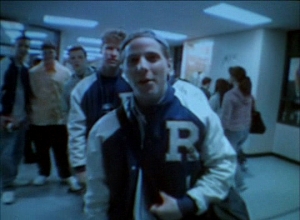 This is Guy Ferland’s third made-for-TV feature, his sixth picture in a career that’s only gone downhill since Alicia Silverstone refused to take her clothes off in front of him. But thanks to all those Daytime Emmys the man continues to find work, turning out episodes for seemingly every crappy (but inexplicably popular) TV series made in the last eight years (from House to The Shield to The Sarah Connor Chronicles). I’ve no idea how much of this flick is his and how much we can lay at Mastrosimone’s feet, but one thing’s for certain: this movie’s high opinion of itself. It’s such a painfully Serious Film even its main character’s cynicism feels forced and inauthentic, a cynical-in-itself nod to audience expectations…not to mention one hell of a stalking horse for the film’s central Message.
This is Guy Ferland’s third made-for-TV feature, his sixth picture in a career that’s only gone downhill since Alicia Silverstone refused to take her clothes off in front of him. But thanks to all those Daytime Emmys the man continues to find work, turning out episodes for seemingly every crappy (but inexplicably popular) TV series made in the last eight years (from House to The Shield to The Sarah Connor Chronicles). I’ve no idea how much of this flick is his and how much we can lay at Mastrosimone’s feet, but one thing’s for certain: this movie’s high opinion of itself. It’s such a painfully Serious Film even its main character’s cynicism feels forced and inauthentic, a cynical-in-itself nod to audience expectations…not to mention one hell of a stalking horse for the film’s central Message.
Trevor “Trashcan” Adams (Ben Foster, know around these parts as “that guy who played Russell on Six Feet Under,” and “that guy who played Warren Worthington III in X3″) is that stalking horse, one of those wonderfully-fictional students with the mysterious power to waltz through school with a constantly-rolling video camera , immune to the (all-too-few) words of protest from the school’s administrators. His camera will be our surrogate eye and already I’m flashing back to Zero Day, fondly hoping this movie will have as much to offer as that little picture.
But then again, no. “Welcome to the nightmare,” Trevor says by way of introducing us to Rivervale High, a school in the grips of that post-Columbine inanity the wider world remembers as Zero Tolerance. “Any suspicion of violence,” Principal Meyer (Gillian Barber) declares over the credits, “physical or verbal, will result in immediate suspension or expulsion. That is Zero Tolerance.” The film quickly exposes this for the flagrantly hypocritical bit of wishful thinking it is/was: while others face expulsion for the heinous crime of forgetting the pocket knife they stashed in the bottom of their backpacks, “Trashcan” Adams is down in the trenches dealing with his daily doses of verbal and physical abuse from Rivervale’s Capital-J, Jocks.
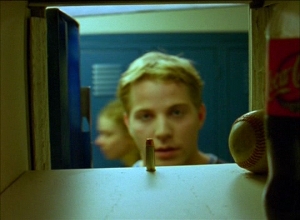 Through a series of heavy-handed, expository statements (the only kind ’round these parts) we learn Trevor pulled some high-profile shit last year and suffered through summer school as a result. He became a community flash point, a minor celebrity as the local Bad Seed and designated “mad bomber,” labeled an official pariah so often he even introduces himself as such to our Designated Love Interest (and Mary Jane Watson-alike), Jenny (Jane McGregor).
Through a series of heavy-handed, expository statements (the only kind ’round these parts) we learn Trevor pulled some high-profile shit last year and suffered through summer school as a result. He became a community flash point, a minor celebrity as the local Bad Seed and designated “mad bomber,” labeled an official pariah so often he even introduces himself as such to our Designated Love Interest (and Mary Jane Watson-alike), Jenny (Jane McGregor).
As the film opens, Trevor’s all geared up for yet another school year as the Perpetual Outsider. Even the geeky, diminutive freshmen are too scared to say, “Hey.” Principal Meyer obviously considers him to be yet another serving of bullshit on her already-overfilled plate, and the school councilor has no idea what to do with him. (So much for all those Adolescent Psychology courses, eh?) If this were anything other than a Serious Film with a Serious Message For Our Time, Bang Bang You’re Dead would’ve left us this glorious set-up, allowing the creeping horror to build and build and build as this Swiss Watch of good ol’ fashioned, American craziness wound down to its inevitable, blood-buttered conclusion.
Instead, here comes the Crusading Teacher on a Mission to Reach Out to Trevor and Include Him. Meet Mr. Duncan (Tom Cavanagh), the humanoid incarnation of Rivervale’s Drama department, and our Authorial Cipher. Mr. Duncan’s Big Idea for drawing Trevor out of his shell? Offer him the lead in a school production of William Mastrosimone’s Bang Bang You’re Dead. What could possibly go wrong, right?
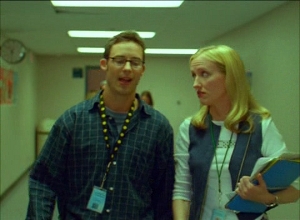 Here the film divides itself, doling out equal time to the parallel tracks of Trevor’s life. On Track A, we watch Mr. Duncan help Trevor into the role of the play’s protagonist, Josh, even as Mr. Duncan struggles against the community unrest generated by the very idea of staging Bang Bang You’re Dead, to say nothing of staging it on school grounds. Track B follows Trevor through the slings and arrows of outrageous high school fortune as he pointedly avoids trying to make anything happen with Jenny (despite her being the Perfect Teenage Girl – somebody really should revoke Trevor’s Adolescent Male License) and, instead, makes friends among the local Trenchcoat Mafia-analog, the “Trogs.”
Here the film divides itself, doling out equal time to the parallel tracks of Trevor’s life. On Track A, we watch Mr. Duncan help Trevor into the role of the play’s protagonist, Josh, even as Mr. Duncan struggles against the community unrest generated by the very idea of staging Bang Bang You’re Dead, to say nothing of staging it on school grounds. Track B follows Trevor through the slings and arrows of outrageous high school fortune as he pointedly avoids trying to make anything happen with Jenny (despite her being the Perfect Teenage Girl – somebody really should revoke Trevor’s Adolescent Male License) and, instead, makes friends among the local Trenchcoat Mafia-analog, the “Trogs.”
Soon, Trevor’s presence pushes the Trogs into an escalating Prank War with Rivervale’s Jock community, and what begins with a few kids stuffed in lockers and trash cans culminates in anonymous bomb threats and exploding firecrackers that disrupt that most-scared of high school institutions, the pep rally. Resultant community outrage forces Mr. Duncan and his poor players out of the school theater, out of community theater, and into a church basement. (So much for that separation of church and state, eh?)
Trevor chooses this point to explore his anger through the medium of student film and, in an apocalyptically stupid move, hands Mr. Duncan a violent revenge fantasy, featuring a character not-unlike-Trevor gratuitously murdering a character not-unlike-Rivervale’s King of the Jocks, Brad Lynch (David Paetkau). Mr. Duncan, in an even dumber (but, for once, realistic) move, turns Trevor’s little assignment over to the principal, mistaking it for the death threat it patently isn’t. (And, hell, even if it is, how many other kids are verbally and directly threatening to “fucking kill” someone else within the school while Mr. Duncan and Principal What’s-Her-Face fuck around making Trevor’s life worse?) Expelled for violating Zero Tolerance Policy, Trevor quits Mr. Duncan’s play, his thoughts taking a turn for the suicidal.
Meanwhile, the Trogs, ignored and unnoticed by everyone but Trevor (and the Jocks, of course), slowly inch closer to their own school-centric rampage massacre. Will Trevor Do the Right Thing and save everyone from the predictable results of their own actions? Will Rivervale ever experience the dubious pleasure of seeing Bang Bang You’re Dead performed in its midst? Will anyone live to see opening night? Do I care?
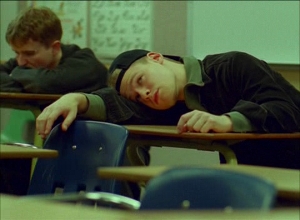 Those elven hundred words make the film seem better than it is. Unlike any of the clueless citizens of Rivervale, I actually have bothered to read Mastrosimone’s play and I can tell you there’s a reason dear William wins Daytime Emmys instead of Tonys. His play oozes pretensions of Coolness, failing in its myriad and unwelcome attempts to be Hip To and/or With “the Kids.” Ferland’s film provides plenty of examples of this during the rehearsal scenes and the long montage at the end (oops…spoiler alert, I guess), finally letting us know just what the hell everyone in the film is arguing over. This also allows Trevor and Mr. Duncan to spell out the play’s key themes for us, the obviously-dense audience.
Those elven hundred words make the film seem better than it is. Unlike any of the clueless citizens of Rivervale, I actually have bothered to read Mastrosimone’s play and I can tell you there’s a reason dear William wins Daytime Emmys instead of Tonys. His play oozes pretensions of Coolness, failing in its myriad and unwelcome attempts to be Hip To and/or With “the Kids.” Ferland’s film provides plenty of examples of this during the rehearsal scenes and the long montage at the end (oops…spoiler alert, I guess), finally letting us know just what the hell everyone in the film is arguing over. This also allows Trevor and Mr. Duncan to spell out the play’s key themes for us, the obviously-dense audience.
Principal Meyers wrongly calls this “a play with no answers.” Hell, the play’s chalk-full of ’em, all as glib and schmaltzy as you’d expect. A product of what Chris White called “the Middle Mind,” Bang Bang You’re Dead is a thoroughly harmless, toothlessly-mainstream play, its shock value safely contained within its title. This comes as no surprise if you’re me and you’ve actually bothered to research school shootings beyond the level of reading the local daily’s coverage of this week’s/month’s/year’s Pop Star for A Day. Mastrosimone wrote the play in response to Kip Kinkel’s May 20, 1998 rampage through Thurston High in the neighboring town of Springfield, stitching bits of that onslaught together with an incident that happened in his child’s school. The result is a failed attempt at universality disguised as an examination of one (fictional) particular.
In short, the play’s main character, Josh, is inspired to murder his classmates by a soured romantic relationship, some Soap Opera-level histrionics, and community (over)reaction to Josh’s writing, “Everyone at this school is dead meat,” on a chalkboard. The usual straw men — hunting with grandpa, toy guns, “violent” video games, rock music, and a certain movie “that makes [Josh’s] pain go away” (obviously The Basketball Diaries) — dance before the audience’s eyes, fulfilling their usual role as triggering mechanisms we can all safely legislate out of existence (once those damn [insert adherents of hated political ideology here] get out of the way). Other, arguably more important factors — Josh’s parents, his school, his community at large, the repressive conformity of “middle class” American society — get off Scott Free, which, again, is no surprise.
Mastrosimone obviously improved as a writer between 1999 and 2002, but he’s written a film that still leaves me expecting Keenan Ivory Wayans to waltz through a scene or three shouting “MESSAGE!” at the top of his lungs. His characters, and their school as a whole, suffer from a marked two-dimensionality. In attempting to map out Post-Columbine America, Mastrosimone (and Ferland, can’t leave him out) flattened and distorted their subject, leaving a map sure to strand you in the same fantasy world where all the culture industry’s visions of high school take place. A world where bells never ring save at plot-appropriate times, you can actually get away with wearing hats in class (even in Detention…which is, of course, called “detention” rather than “After” or “In-School Suspension”…sweet Jesus), and crusading Drama Teachers actually exist.
The following speech, delivered to Jenny by a montage of voices which I’ve combined for clarity, serves as her (and our) introduction to just how contrived Rivervale High really is. Thank God it comes right near the front of film, letting us all know what we’re in for:
“You have to be Varsity or a Cheerleader to sit at this table. Or know everybody. That table’s for the Druggies, Stoners, Deadheads, Burnouts, and the Hippies. That one, Preppies. Then you have the Skateboarders and Skateboard Chicks. Then Nerds and Techies. Up against the wall, the Wiggers, Hip-Hoppers, Rednecks, Goths, and all manner of Freaks, Troublemakers, Losers, Sluts, Gays, Floaters, and the Trogs…Troglodytes. Freakiest of the Freaks. “
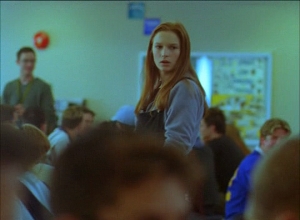 This kind of social breakdown, shot through with redundancies and emotionally potent oversimplifications, is fine for a college sex comedy from the 1980s. But in a Serious film such as this it smacks of lazy writing and the vast gulf between the filmmakers and actual high school experience (theirs or someone else’s). You might get this kind of broad-ranging, sociological soliloquy out of your school’s Goths, Stoners, or Trogs, but (speaking from my own experience) certainly not from the Varsity cheerleaders! Jenny (as a sixteen-year-old non-cheerleader) certainly wouldn’t need to ask them where to sit at lunch anyway, unless we’re to believe no one talked to her during the preceding half-day of classes? I can’t imagine any self-respecting sixteen-year-old girl with B.O. that horrible.
This kind of social breakdown, shot through with redundancies and emotionally potent oversimplifications, is fine for a college sex comedy from the 1980s. But in a Serious film such as this it smacks of lazy writing and the vast gulf between the filmmakers and actual high school experience (theirs or someone else’s). You might get this kind of broad-ranging, sociological soliloquy out of your school’s Goths, Stoners, or Trogs, but (speaking from my own experience) certainly not from the Varsity cheerleaders! Jenny (as a sixteen-year-old non-cheerleader) certainly wouldn’t need to ask them where to sit at lunch anyway, unless we’re to believe no one talked to her during the preceding half-day of classes? I can’t imagine any self-respecting sixteen-year-old girl with B.O. that horrible.
Come to think of it, Jenny (as the Token Girl) could serve a microcosm for everything wrong with this film. That’s not Jane McGregor’s fault. She plays her role to an exceptional hilt. But unfortunately, she highlights the filmmakers ignorance of teenagers in general and teenage girls in particular. I dubbed her Mary-Jane for a reason: like everyone else in the cast, she’s too goddamn perfect. Intelligent, independent, open-minded, friendly, sure of herself, not least bit depressed, manipulative, self-conscious, self-possessed, or concerned for her overall social status, she’s the apotheosis of Young American Womanhood, the kind of girl every desperate high school looser hopes will drop out of the sky and offer to sit across from them at lunch. Her “relationship” with Trevor (forced and half-hearted though it may be) is supposed to “reform” him in the audience’s eyes, because there’s no better way for lazy writers to humanize their characters than to show them trying (and failing) to form romantic attachments. (Witness Mr. Duncan’s date with Janel Moloney [known around here as “The West Wing‘s Donna Marsh”], which goes a whole lot of nowhere and never comes up again.)
Instead, her presence in the film economically humanizes Trevor at the expense of every one else in the cast, especially the Trogs. They’re the ones quietly going mad while Rivervale as a whole wastes time labeling Trevor, and if that’s meant as a sly dig at all the clueless parents and administrators who’s favorite game in the wake of April 20, 1999, became “Get the Geeks,” then Bang Bang You’re Dead commits the very sin it warns against.
Again, none of this is the actor’s fault. Everyone does the best they can with roles thin as the sweat on a teenager’s brow (while s/he masturbates – something else safe-for-TV kids never do, thank you very much). Ancillary characters are reduced to the level of abstract Ideals, little more than moving parts manipulated by Trevor’s (and Mr. Duncan’s) bumbling. This allows the film to manipulate its audience, keeping us all in our seats as we wait, wait, wait for something to happen. Some character to emerge from the otherwise-unremarkable pack of nonentities. They, apart from Trevor and Mr. Duncan (who’s stories, frankly, aren’t interesting enough to support ninety minutes – not with so much else going on), are the plot’s wrapping paper, discarded when they no longer serve the film’s single-minded purpose.
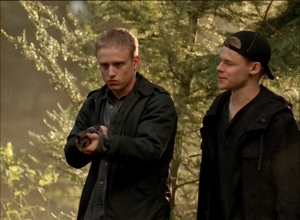 And that is not, as the literature would have us believe, to “promote awareness of the causes of school violence.” Instead, it’s to put those causes firmly out of our minds, sure in the knowledge that everything will work out for the best in under ninety minutes after an unrealistic come-to-Jesus moment.
And that is not, as the literature would have us believe, to “promote awareness of the causes of school violence.” Instead, it’s to put those causes firmly out of our minds, sure in the knowledge that everything will work out for the best in under ninety minutes after an unrealistic come-to-Jesus moment.
Bang Bang You’re Dead trots this out around the hour mark, when Principal Meyer, Mr. Duncan, Trevor, Trevor’s family, and representatives of local law enforcement all “take a hard look at our school,” through the lens of Trevor’s camera…and the tapes the cops seized in a principal-inspired raid on his house…the kind of “hard look” no one in the American educational system is the least bit willing to take at their own schools. The very reason, in fact, handheld video cameras were (are?) banned from every sane school in America…save those pre-installed by the administration. They can spy on us, by don’t you dare spy on them, bub…or on each other. You might accidentally expose just how traumatizing and god-fucking-awful high school really is, and Lord knows no American is ready to consider that possibility (in public, at least).
I’m all for Trevor doing the Right Thing in the End, but I can’t support a movie that slaps a cold compress on a sucking chest wound and calls it good. “It’s not what’s in a kid’s backpack that makes them dangerous,” Mr. Duncan warns the principal, “it’s what’s in his heart.” [Dramatic pause…no, really, I shit you not] “This play is the best way I know how look into a kid’s heart.” Yeah, right. Well, excuse me, Mr. Duncan, but my sixteen-year-old self has a bird he’d like to flip you. What the hell are you, man, a first-year TA? The average high school freshman has already suffered fifteen years of anal-retentive parental surveillance and micromanagement. Then, just when they thought it was safe to relax and unwind at the top of the middle school heap, they’re thrown to a new pack of wolves (called “the juniors” and “seniors”) without so much as a, “Sorry, dudes and dudettes…looks like four more years of climbing an unforgivably-steep social ladder for you.” The last thing a kid wants is some play telling them what’s in their hearts. That shit is, like, so sixteenth-century. But you never were a teacher, were you? You’re an actor, reciting lines written by a well-meaning writer who’s obviously thought everything he feels the need to think about this particular subject. Making this little more than a ninety-odd-minute apologia for the play that shares its name. (And don’t think I don’t notice, or appreciate, those occasional swipes at the wider Eugene community, or their real-world negative reactions to the play’s initial performance.)
Rather than debate its own pet issue seriously (or at all, for that matter), Bang Bang You’re Dead comes already set on a course it will not be diverted from, no matter how much we might shout at our TVs. If you wanna take a hard look at your school, give your kid a camera sometime (see how long it survives), or go down there yourself and see what you can find. Odds are good the result will be much more educational, and provide fodder for a much more substantive discussion, than this film.
![]()
![]()

Laughs at how some people thought this was realistic – it’s a portrayal of what everyone thought Collumbine was about, bullying, the trenchcoat mafia, even the media is brought in. I like the parody of zero tolerance but it’s as subtle as a sledgehammer. The TCM analogue have no personality at all. Trevor has SOME in his video log one redeeming feature. The happy ending exists only if you IGNORE every possible consequence of the final act. It’s not as bad as elephant’s interpritative dance school. The Beano / Dandy quality bullying was similarly not of this world. Being English I’m wondering if cliche cliques exist IRL in America, if school life is as depicted I can sure sympathise with Trevors but I highly doubt this isn’t another caricature like so much in the movie. The “art saves all” was a Disney kiss saves the Beast. The drama teacher was an author avatar for SURE.
Like any stereotype, Rivervale High formed itself around a small grain of truth. But instead of turning into a pearl it turned into a dried-up hunk of shit. As I said, that sociological soliloquy Mary Jane Jenny receives is more a collection of buzzwords than an actual description of reality. Now, keep in mind, I can only speak from personal experience, and high schools like Rivervale could very well exist. It’s a problem we all have when discussing public education issues. There’s always that urge to begin every sentence with, “Well, at my school, for example…”
At my school, for example, no distinctions were made between “Nerds” and “Techies” and very nerdy subjects (like crop-raising, animal husbandry, proper farm equipment maintenance, etc.) were treated like the province of everyday life…because they were to a vast majority of the population. Calling them “nerdy” would’ve earned you dull, empty look of incomprehension, betraying the truth of Neil Stephenson’s claim that “we’re all nerds now.” Since mine was a monochromatic part of the country, every “Hip-Hopper” became a “Wigger” by default (though the term “Hip-Hopper” was something of an anachronism by the time I reached high school). There were no “Preppies” because there were no prep schools, and anyway, rural American loves to pretend that social classes don’t exist. Everyone just knew so-and-so’s family owned more land than such-and-such…that’s why we gather to get drunk and party at so-in-so’s whenever so-and-so’s absentee parents leave for a weekend. The “Skateboarders” kept their decks at home and did not identify as such, these being the days before skateboarding’s expansion into the cultural mainstream. By contrast, almost everyone identified as a “Redneck,” to the point of sticking decals in the back windows of their trucks that declared as much. You would’ve had to search high and low to find someone of either gender who didn’t meet the a broad definition of the term “Jock.” Driveway basketball hoops were as thick as thieves. Saying “Druggies, Stoners, Deadheads, Burnouts, and Hippies” would’ve been like saying the same thing five times, and all of them were pejorative terms for other people. Like “Looser” “Slut” “Floater” or “Gay,” no one would’ve daredself-identify as a Hippie…no matter how much they smoked during the aforementioned parties.
I, if I was anything, was the school “Looser,” “Floater,” and one of many “smart kids,” the only one who proudly self-identify as a “Nerd” (because I lived the lessons Revenge of the Nerds taught me and learned to take pride in what I was). This resulted in more good things than bad, though I wouldn’t have said it at the time. Girls would always asked you to help them with assignments if you’re “smart,” giving you plenty of opportunity to stare down their shirts as they lean across a table at you. Besides, nerd girls are the hottest, and I’ll give them film this: joining the Drama department is still the quickest way to meet hot, nerdy girls. (And to any high school nerds who happen to be reading this…take heed. Just do it, guys: you’ll have fun, and get to make out in the bathroom.)
Unfortunately, a reputation for intelligence earned me the obligatory “faggot” label from my male contemporaries. My kinky hair resulted in calls of “nigger,” and the one honest-to-God fight of my high school life. (And the only instance of universally-recognizable “bullying.”) I was the only “Goth” by virtue of the fact I wore a long coat, and I hated the label. No one else had heard of a little Sam Raimi film called Darkman, so they all assumed I was a Trench Coat Mafia of one, kept calm, and carried on. At the time, I hated Goths, despite the fact that I’d never met one…except through the mass media.
And that’s the kicker: the real horror of the culture industry’s stranglehold over the means story production. Thanks to barriers of format, time, and talent, the industry’s products inevitably flatten and distort reality. Characters are slotted into neatly-arrangeable boxes because ambivalence would take time, and nuance is The Enemy of immediacy. Look at all the verbiage I just cranked out, barely sketches my own experience inside the infernal pit of American public eduction. Multiply that by as many characters as you need for a plot (like Bang Bang You’re Dead‘s plot) and the nightmares begin. I know I’d resort to stereotyping, too, just to keep myself sane, and to keep the project from spiraling outward to Dostoevskyian lengths. It still sucks, though, because by now we’ve got a generation of creatives who don’t even bother bringing their real life, youthful experience to the screen. They just watch other films, pick out the broad stereotypes that’ll be most convenient to their stories, and fire away. No wonder they miss the target so often. Half they time, they aren’t even aiming for anything real.
We didn’t have detention…we had “Justice Under God”….but that’s what you get when you slack off in Middle School and your parents send you to a boys Catholic high school to get some discipline. We all called them “JUG”, so you’d get “JUGGED”. I think the combination of the fact that I’m now creeping towards my 20th reunion with the Catholic school thing means that some of the labels used here were pretty familiar, but there’s always local variations. With us there were the, let’s see, there were Jocks, but they weren’t a unified group; generally if your only identity was with your sport you were more or less a special kind of loser, above others, maybe, but not alone. There were the metal heads…yeah, we still had a few in the early 1990s, though many were in the process of shifting to belonging more with the grunge kids, the softer edge of whom would probably have been fans of “College Rock” in a slightly earlier era. There were the rich kids, who were generally from the coast of my state, and were a mix of preppy “Young Republicans” of 1980s teen films and stoners. The New England hippies could be those rich kids, or they could just be fans of the bands (Phish was just coming along so at the start of my high school years they were all into the Dead and Led Zepplin and a smattering of newer acts) and the lifestyle. We didn’t have Goth kids, because we were between waves of Goths, or so I remember it it. The few African American kids tended to be grouped in with the Italian American kids, in a group mostly united by love of Hip Hop and R+B; a lot of them were on the football and basketball teams, and were also sort of the jocks. Then the losers….I’m trying to think of the losers. There were the smart nerds, the nerds nerds, the kids who not only smart but did well in school and worked to get good grades, and who tended to be into nerdy subjects. Then there were the weird nerds, kids who just didn’t fit in-some were loners (the guy who clearly had serious developmental issues, for example). There were a few effeminate, clearly gay guys-in an all boys school they got harassed constantly-the kids from our hometowns said we were going to “Gayvier” and gave us the sage advice to “not drop the soap” so often that, I kid you not, it was frowned upon to take a shower after gym class lest you be deemed “gay”. Those few left quickly. Then there were kids who liked nerdy subjects-maybe you quoted Python movies and listened to Weird Al too much, maybe you liked tabletop role-playing games, maybe you just were socially awkward. I was in that crowd, at school at least (in my hometown I hung out with a group of gamer geeks, which ran the usual mix of types), though I can’t say we didn’t have internal divisions. We had a few kids who ran into trouble with the law-one was shot by the police in a domestic dispute, one who killed his parents, one who came to school to shoot a kid he hated-none really fit the classic bullied kids profiles. I was lucky that my interests/look wasn’t really a stereotype yet…I wore a bunch of different long trenchcoats…most wool and military, more a product of my military history obsession and love of stuff from the teens to the forties-but there were no “trench coat mafias”yet.
The movie has the redemptive quality that self styled critics seem to miss: art imitates life vs life imitates art, in its perception. The plot progresses logically as a play. The central character has a conscious and he is caught up in evaluating his experiences of acceptance, affection, loyalty, equality, sometimes recorded on his video camera. He evaluates the bulleying as unjust and and the labeling as detrimental to healthy mental growth in his peers. This affect he has experienced at school as labeled a Trog and terrorist. All of this he tries to break out of as sympathetic, angery, and reactive. He has misplaced loyalties toward his fellow peer group, but consider his stage of mental moral and intellectual development as a new kid in a new school a freshman/ sophomore as well. This conflict between right and wrong is planned to be set right by his peers with mass murder and suicide at Rivervale High. One serious definition, on a personal level, of maturity is the ability to find more than one solution to our problems. Trash and toilet canning, threatening 30 caliber bullets in the locker, fantasy get-even video gaming, and target practice with lethal means are not mature ways to make a moral or ethical plea for justice. Finally Trevor Adam’s is having these conflicts and by foiling the Trog’s planned mass murder spree on their fellow classmates, at the last moment, exemplifies his success in the quest for a better solution ultimately signifies an emotional and mature success. This growth in Trevor as signified in the play, art imitating life, also adds the elements of hope in human instincts to ultimately make the right decisions when it comes down to it.